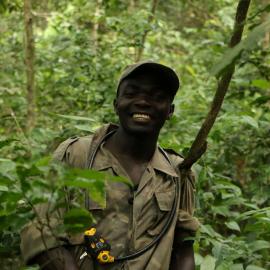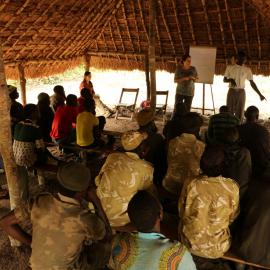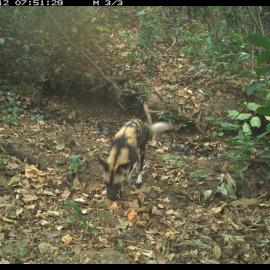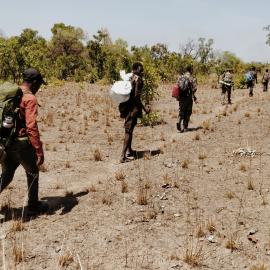Fauna & Flora International - South Sudan Programme
Current initiative
Published
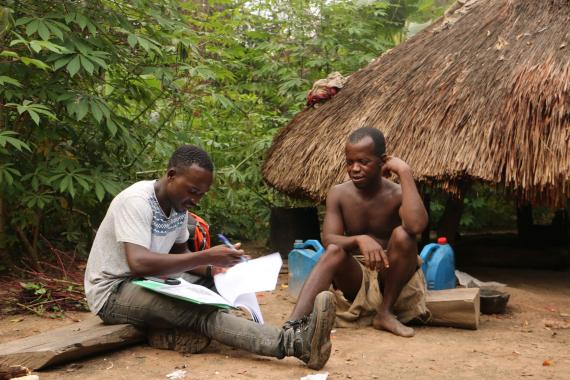
Household survey. Credit: Benoit Morkel.
Fauna & Flora International (FFI) provides support to the South Sudan Ministry of Wildlife Conservation and Tourism (MWCT), encompassing the Wildlife Service (WLS), and local communities through technical expertise and direct funding for the improved conservation management of three of the country’s protected areas (PAs) in Western Equatoria State.
Lead

Location
3 PAs in Western Equatoria State, south west South Sudan. The areas lie between the ecoregions of the forested Central Africa and the savannah East Africa, near the watershed of the Congo basin and the White Nile.
The poaching and wildlife trade problem
Species affected Chimpanzee Pan troglodytes , Common duiker Sylvicapra grimmia , Pangolins
Products in tradeWild meat, skins, live animals.
Overview of the problem
As South Sudan emerges from decades of civil war, under-development is pervasive. Arms are prolific among the population and food insecurity, reaching the level of famine in parts of the country, has resulted in a population turning to what natural resources are easily available to them. There is long-term subsistence poaching in the three PAs which contributes to the illegal trade of wild meat. Government agencies are severely under-resourced which leaves the WLS in a difficult position in managing the country’s PAs, particularly in protecting wildlife against well-armed poaching groups. Additionally, the MWCT has banned all wild meat and imposed punishments.
In Western Equatoria, there is a lucrative and dynamic wild meat trade. Poaching is done by locals and outsiders, for subsistence and commercial use, and may involve many different individuals in the trade network: a hunter, poacher, trader, smuggler.
The anti-IWT initiative
As the Government agency responsible for protected area (PA) management, the MWCT/ WLS lead efforts in combatting poaching. FFI role is to provide support to the WLS by providing equipment, resources and training. Additionally, we provide equal support to local communities and certain members selected by the community leaders, referred to as Community Wildlife Ambassadors (CWAs). The training FFI provides includes covering the subjects of PA management, South Sudan wildlife laws, biomonitoring and patrol procedures, handling of live animals and wild meat, and practices/ techniques for mitigating wildlife conflict. FFI also supports livelihood projects among local communities which involves improved education, small enterprise facilitation, and livestock and agriculture development.
FFI’s unique model of empowering both the WLS and CWAs has proved very effective in reducing poaching for several reasons. It provides employment, resources, infrastructure and training to areas where few such opportunities exist, garners local support for the conservation of the area, and augments the WLS force with (wo)manpower, local knowledge and expertise. This model has been particularly beneficial in strengthening governance structures of the GRs for reasons of accountability and consistency among all relevant stakeholders. Simply, this support has helped the WLS and local communities achieve improved PA management and reduced IWT.
Alongside the WLS and local communities, FFI has recently developed and is rolling out a methodologic approach to gathering data on the wild meat trade, including getting information on handling practices, local preferences, the extent of the wild meat trade, and the range of targeted wildlife species.
Inclusion of gender, age and ethnic groups
As an organisation, FFI recognises biodiversity conservation and the sustainable management of natural resources are inextricably linked to people’s rights to secure their livelihoods and live in dignity. FFI is committed to ensuring that its conservation activities at the very least do not further disadvantage poor, vulnerable or marginalised natural resource-dependent people. FFI strives to design and implement conservation initiatives that, wherever possible, help to improve human well-being and social equity, and which contribute to the achievement of the internationally agreed Sustainable Development Goals. FFI is committed to respecting human rights and ensure that these rights are protected and realised within its conservation programmes and supports the improvement of governance systems that can secure those rights.
Cognisant of the social norms of the people around these 3 PAs FFI sensitively incorporates gender/ age/ ethnicity into all programme activities – both in the development and implementation - ensuring that systems promoting equality are present not only during FFI’s involvement in the project but in perpetuity. We encourage the involvement of women, the youth and elderly, and all ethnic groups. An example of this is, when selecting CWAs, FFI strongly encourages community leaders to include at least one woman, one youth and one elder in each patrol team of 5.
The strategy
Strengthening disincentives for illegal behaviour
FFI provides the wages for patrols teams once they have returned from patrol, as well as all the necessary equipment. Teams include both the WLS rangers and CWAs. Note, this is not a monthly salary nor a performance-based payment.
The involvement of CWAs and the dedicated training/ awareness-raising activities of FFI increase knowledge of wildlife laws and penalties among communities.
The Azande, the predominant tribe of Western Equatoria, are historically agrarian and therefore have only turned to poaching in desperation. FFI’s activities have supported and strengthened traditional norms by providing opportunities otherwise unavailable in the country’s current state.
Increasing incentives for wildlife stewardship
Besides incentives described above, FFI is supporting the establishment of a Community Conserved Area (CCA) which will act as a buffer zone around two of the three PAs, increasing sustainable, subsistence natural resource use and has the potential of payment for ecosystem services and tourism. The local communities will have legal land tenure of the CCA – a policy change which FFI is facilitating and will afford local communities increased ownership and food security.
FFI has supported the lengthy demarcation process of the PAs which has now been ratified by state law, and which has benefited stakeholder engagement and area development.
Decreasing the costs of living with wildlife
FFI has trained local communities on context-specific practices/ techniques for mitigating wildlife conflict as well as provided certain necessary resources – ropes, tools, etc.
Increasing livelihoods that are not related to wildlife
FFI supports livelihood projects among local communities which has involved setting up a school, a clinic, facilitating small enterprises, and livestock and agriculture development.
Build/and or support sense of community ownership or stewardship
Further detailThrough the unique model of involving CWAs in PA management, local communities have an improved sense of ownership and stewardship of their reserves and national parks. Additionally, it is expected that this will greatly increase with the establishment of the CCA.
Improving education and awareness
Further detailFFI has dedicated awareness raising activities run in the communities surrounding all three PAs, providing information on sustainable natural resource use and biodiversity conservation, sharing research findings including photos collected through the camera-traps deployed in the PAs.
FFI has partnered with Caritas Austria and a national NGO, Community Organisation for Development (COD), to implement its livelihood projects in two of the PAs. Together we have built one school to date and have put two individuals from the local community through extensive year-long teacher training. This has bettered education levels and, as a result of encouraging environmental issues to be included in the school curriculum, increased knowledge not only among the youth but general population too.
Has the initiative made a difference?
Increased patrol frequency and effectiveness – patrol teams are well trained and equipped to carry out more effective patrolling. In two of the PAs, there is now at least one patrol team present in the reserve at all time.
Decreased incidences of poaching/ sign of poaching – analysis of patrol data indicates there is a significant decrease in poaching incidents.
Established road and communication networks – FFI has supported road construction/ clearance to key sites and has provided numerous motorcycles which serves as a means of communication and transport for the WLS and local communities.
Biomonitoring data collection – since 2015, we have implemented the systematic collection of biomonitoring data; recent analysis of which is showing beneficial impact of increased patrol efforts on biodiversity.
Discovery of new species/ extension of known ranges – research championed by partner institution, Bucknell University, has led to the discovery of 3 entirely new species (1x bat, 2x rodents) and the presence of endangered/ little unknown species (chimpanzees, African golden cat, bongo), or the extension of known home-ranges (forest elephants, potto).
Baseline socio-economic data gathered by FFI - a comprehensive household survey was collaboratively developed by Bucknell University and FFI with the aim of gathering basic socio-economic data and information related to livelihood practices, human health, knowledge of wildlife laws, relationship with wildlife and natural resource use. The survey was developed and rolled out with support from the Darwin Initiative and the Rainforest Trust in the communities neighbouring the 3 PAs in August and November 2019 respectively. The survey will be run annually for 3 years in both locations, and full analysis of data is ongoing.
What works and why
Establishing the model of employing community members as CWAs has been extremely effective. An example of its success is that in 2016-2017 there were periods of insecurity where armed militia groups were present in the area around the game reserves and the WLS, as an armed branch of the government, was not able to maintain a presence at the ranger post. The CWAs and local community protected the game reserves with force or non-compliance with militia groups.
Managing good partnerships is a crucial activity in FFI’s programme operations and our continued investment in these relationships is one of the main reasons for FFI’s longevity in the region and its popularity. We have also found that every relationship is important and worth fostering. The government and community leadership structures have a degree of fluidity and the political climate can change quickly. Social norms and a lack of developed communication systems dictate that the in-person meetings are necessary and the most effective form of relationship management. FFI is expected to provide constant updates and attend meetings, all varying in their degree of formality. These exchanges are time consuming and often personally demanding but they are rewarding, and results are normally immediate.
Maintaining equipment – vehicles, generators, etc. – is essential in this situation where it is extremely difficult to source new items or replacements.
Factors for success
Supportive national policy/legislation for devolved governance of natural resources
Sufficient time investment in building relationships and trust between the initiative and local communities
Devolved decision-making power so local communities have a voice in creating or co-creating solutions (as part of the initiative)
What doesn’t work and why
Difficult to maintain/ grow programme activities during civil unrest and insecurity.
Ambiguity in national legislation regarding wildlife conservation/ natural resource use/ labour laws, as a result of South Sudan’s recent independence, proves a challenge in ensuring compliance and securing supportive legislation.
Factors that limited or hindered success
Lack of supportive national policy/legislation on sustainable use of natural resources
Ineffective and unaccountable community-based natural resources management institutions
Unclear and intangible benefits to local communities from wildlife (These may be financial and/or non-financial)
Organisers, donors and partners
Halcyon Land & Sea, CITES MIKE MERM, Darwin Initiative, The Rainforest Trust, Elephant Crisis Fund and Lion Recovery Fund
For further information contact (peoplenotpoaching@gmail.com).
